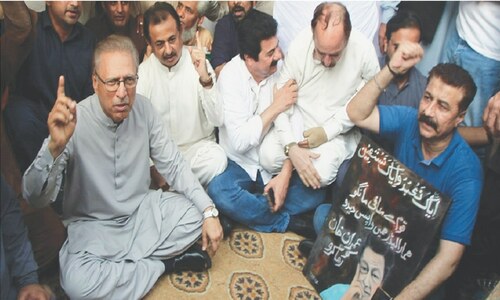ISLAMABAD: The Pakistan People’s Party’s (PPP) Parliamentary Leader in the Senate, Raza Rabbani, has written to all four chief ministers, asking them to be vigilant of the ongoing privatisation process and take steps to protect the interests of the provinces.
Terming the privatisation policy of the present government “unconstitutional and illegal,” Mr Rabbani has asked the chief ministers not to allow the privatisation of any unit without the approval of the Council of Common Interests (CCI), as per the Constitution.
Mr Rabbani distributed copies of the letter among reporters at a news conference at the PPP Media Centre here on Tuesday.
Flanked by Senator Farhatullah Babar and Nazir Dhoki, the party’s media coordinator, Mr Rabbani announced that the party would contact all trade unions and labour federations in the country after Eid to form a “united workers’ front” to resist the privatisation of national institutions.
He said the PPP would not allow retrenchments from the institutions in the name of privatisation and would use all possible means to protect the rights of labourers.
The PPP, he said, would not hesitate in using the forum of parliament or its street power to protect the rights of labourers.
Mr Rabbani alleged that the federal government was pursuing the privatisation policy at the behest of the International Monetary Fund (IMF) and to please its “favourite business cronies”.
He criticised the government for taking refuge behind the approval, granted by the CCI several years ago, with regard to the privatisation of certain units and said the Supreme Court, in the Pakistan Steel Mills’ case, had already observed that “since a lot of water has passed under the bridge, it will be appropriate if the CCI reconsiders the matter”.
“Clause (7) of Article 154 of the Constitution provides that if your government is dissatisfied with a CCI decision, it may refer the matter to parliament, in a joint sitting, whose decision in this behalf shall be final,” says the letter.
The PPP leader has also suggested to the chief ministers that they can discuss matters related to privatisation in the provincial assemblies and can also pass resolutions.
“If your government considers the matter important enough it may initiate a discussion in the provincial assembly and express the will of the majority through a resolution,” reads the letter.
Mr Rabbani has informed the chief ministers that “most of the units being processed for privatisation are trans-provincial and fall within the purview of the Federal Legislative List Part-II in the Fourth Schedule of the Constitution”.
The PPP leader says that “a number of units being processed for privatisation pertain to oil and gas and fall within the purview of clause(3) of Article 172 of the Constitution” which gives ownership rights to the provinces on natural resources.
He reminded the chief ministers that Article 154(1) of the constitution “provides that the CCI shall formulate and regulate policy in relation to matters in Part-II of the Federal Legislative List and shall exercise supervision and control over related institutions”.
He writes: “On a number of occasions, the superior judiciary, including the Supreme Court of Pakistan, has held that the policy of privatisation with reference to such units needs to be discussed and approved in the CCI.”
Published in Dawn, July 23rd, 2014















































Dear visitor, the comments section is undergoing an overhaul and will return soon.